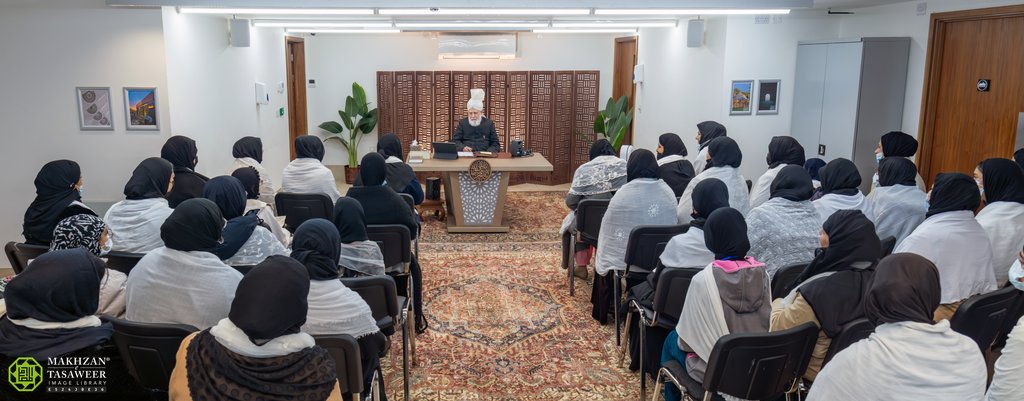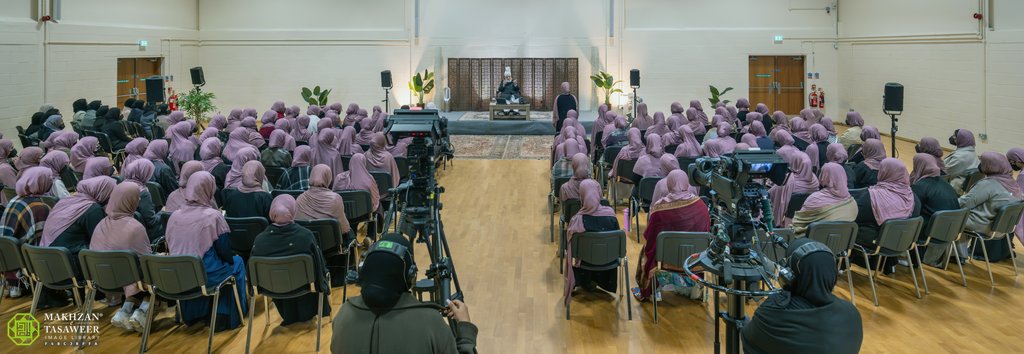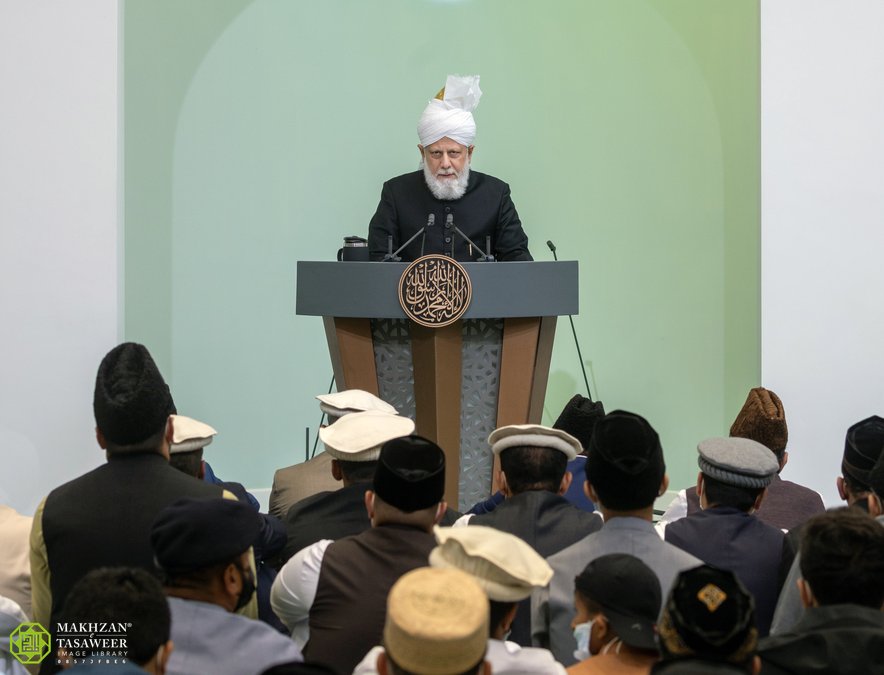
Lajna Members from the Nordrhein Region, Germany, Met with His Holiness, Hazrat Mirza Masroor Ahmad
“People wronged him (the Holy Prophet of Islam), yet he bore every form of suffering… However, he never abandoned his trust in Allah. That is the essence of ‘tawakkul’ – true trust in Allah the Almighty” – HAZRAT MIRZA MASROOR AHMAD
On 20 October 2025, members of Lajna Imaillah from the Nordrhein Region in Germany had the honour of meeting with His Holiness Hazrat Mirza Masroor Ahmad, the Worldwide Head of the Ahmadiyya Muslim Community.
During the meeting, members had the opportunity to seek the guidance and counsel of His Holiness on a broad range of matters.
One attendee asked His Holiness about the importance of durood – invoking salutations upon the Holy Prophet Muhammad (peace and blessings of Allah be upon him) – and if one can devote their prostrations to invoking durood upon the Prophet (peace and blessings of Allah be upon him).
In response, Hazrat Mirza Masroor Ahmad stated:
“It is stated in a Hadith that invoking Durood Sharif is essential for the acceptance of prayers, and the Holy Prophet (peace and blessings of Allah be upon him) also emphasised this. The Holy Prophet (peace and blessings be upon him) said: ‘Pray, and in your prayers, also invoke blessings upon me.’”
His Holiness then quoted chapter 33, verse 57 of the Holy Qur’an, in which it has been said: “Allah and His angels send blessings on the Prophet. O ye who believe! You also should invoke blessings on him and salute him with the salutation of peace!”
His Holiness, Hazrat Mirza Masroor Ahmad, continued:
“The Holy Prophet (peace and blessings of Allah be upon him) said that a prayer remains suspended until blessings are invoked upon him. Allah the Almighty has sent the Holy Prophet (peace and blessings of Allah be upon him) in this era as the final Prophet, His beloved, and the bearer of the final law; thus, it is incumbent upon us to invoke blessings upon him.While reciting Durood Sharif during prostration is not obligatory, it is commendable. Once, in a gathering, someone mentioned to the Promised Messiah (peace be upon him) that he devotes half his prayers invoking blessings upon the Holy Prophet (peace and blessings be upon him.” The Promised Messiah (peace be upon him) commended him for this. Another companion also mentioned how he also regularly invokes durood and he was also commended for it. Anothr companion, Hazrat Mufti Muhammad Sadiq (may Allah be pleased with him) mentioned that he will devote all his prayers invoking durood. The Promised Messiah (peace be upon him) said that this will be an excellent practice and he should most certainly do so because if he sincerely invokes durood, Allah the Almighty will accept his other prayers as well.”
Another attendee asked His Holiness about the balance between fear and courage, stating how, at times, a person allows fear to overcome them to the point of cowardice, while at other times they display bravery to the extent of folly. The attendee asked what the proper limit of courage should be and to what extent one should have fear of the world.
In response, Hazrat Mirza Masroor Ahmad said:
“A believer’s true strength lies in insight and wisdom, in prudence and intelligence. These are the qualities that define a true believer. When something permissible is done in the wrong context, it can become harmful; likewise, when something forbidden is committed, it too causes harm. Therefore, one must always speak the truth, but with wisdom. It is mentioned in the Hadith that speaking a word of truth before a tyrant ruler is a great act of virtue.”
Hazrat Mirza Masroor Ahmad continued:
“Hence, before speaking, one should reflect upon whether the truth they are about to say will bring more harm or more benefit, and whether it is better to say it publicly or privately. For instance, if you are pointing out someone’s flaw or making a statement that might affect another’s life and expose their faults before others, then remember that Allah the Almighty has also commanded covering the faults of others whilst saying that He Himself conceals faults. Therefore, one should also embody this quality and refrain from exposing others’ weaknesses in public…”
His Holiness continued:
“As the Promised Messiah (peace be upon him) has said, if you see weaknesses in others, pray for them for forty days before attempting to reform them. If, after your efforts, there is still no change, then inform those responsible – such as office-bearers or individuals capable of guiding them – but only for the purpose of reform, not reproach. Allah the Almighty has granted believers reason and intellect, which is why He has commanded to act with wisdom.”
His Holiness then quoted chapter 41, verse 35 of the Holy Qur’an, in which it has been stated that one should “repel evil with that which is best. And lo, he between whom and theyself was enmity will become as though he were a warm friend.”
Whilst explaining the meaning behind this verse, His Holiness continued:
“Even if there exists enmity between you and another person, use gentle words and a kind tone. If you respond with wisdom and goodness, reconciliation will be established between you and your adversary, and friendship will replace hostility. But if you act bluntly and rudely, then that is sheer foolishness…”
Continuing, Hazrat Mirza Masroor Ahmad said:
“When advising others, do so privately… Lajna members and Nasirat should be guided with kindness and confidentiality. Do not humiliate someone publicly… Such behaviour will not reform them; it will only cause harm. Your duty is not to instil fear or authority but to bring about reformation with compassion.
“Every member of Lajna should feel that her Sadr* is her well-wisher, her sister, and someone who genuinely seeks her betterment. When this personal bond of affection develops, it strengthens the entire sisterhood and helps build a true society. This, in fact, is the very purpose of the organisation of the Community. If you adopt this spirit, you will fulfil your duty to represent both the system of the Jamaat and the Caliph of the time.
“There must be courage, but it must be guided by wisdom. The Holy Qur’an teaches that sometimes reformation comes through discipline, and sometimes through forgiveness. Therefore, act according to the situation and decide with discernment.”
A young attendee then asked His Holiness how siblings can avoid falling into fights and disputes. Hazrat Mirza Masroor Ahmad stated:
“Offer your prayers regularly. Show good manners. Drink cool water.”
His Holiness continued:
“If you have good manners and you behave kindly, there will be no fighting. If you have said something wrong, that may cause the other person to react. But if someone quarrels with you, cover your ears and walk away, saying, “I will not fight.” It is mentioned in the Hadith that when a person is fasting and someone argues or speaks harshly, they should say, “I am fasting; I will not fight, nor will I utter anything bad.” The Holy Qur’an also teaches to avoid vain and useless talk. So, you too should stay away from vain and meaningless speech. Drink cool water, sit down, and remove yourself from the situation. If you have younger brothers, you should treat them with kindness. If you have elder brothers or sisters, treat them with respect. If someone tries to intimidate you, quietly move to another room. If a younger sibling quarrels with you, forgive them.”
Another attendee asked His Holiness about trials and tribulations and what one should do in order to stay firm in their resolve and trust in Allah.
In response, Hazrat Mirza Masroor Ahmad said:
“The Holy Prophet (peace and blessings of Allah be upon him) endured trials for thirteen long years. We call him the Beloved of Allah, yet even after the Victory of Mecca, he continued to face hardships and battles. People wronged him, yet he bore every form of suffering… However, he never abandoned his trust in Allah. That is the essence of ‘tawakkul’ – true trust in Allah the Almighty…
“Beyond this, what else do we possess? What other path is there for us? At the very least, we must hold firm to the belief that if we face trials and tribulations in this world, it is because Allah seeks to test us. If we remain steadfast and succeed in this test, then our true reward will be in the next life. That is the real life – this worldly existence of seventy or eighty years will soon pass. But when we meet our Lord in the Hereafter, if we have placed our complete trust in Him, everything will, God willing, be made right.”
* Sadr – In the context of Lajna Imaillah, a Sadr is responsible for overseeing the moral, spiritual, and administrative training of members within her area, guiding them according to the directives of the Caliph and the overall objectives of the Community.[/vc_column_text][/vc_column][/vc_row]

